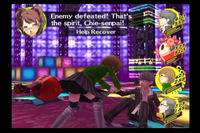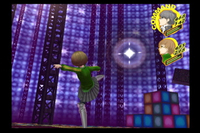|
|

|
PLATFORM
|
PS2
|
BATTLE SYSTEM
|

|
INTERACTION
|

|
ORIGINALITY
|

|
STORY
|

|
MUSIC & SOUND
|

|
VISUALS
|

|
CHALLENGE
|
Moderate
|
LENGTH
|
60-80 Hours
|
|
OVERALL

|
+ Wonderful setting and story
+ Characters are believable
+ Interaction is vastly improved
+ Party members can protect you in battle
+ Great pacing, very addictive
- No more Lotus Juice???
|
Click here for scoring definitions
|
|
|
As the PlayStation 2 clings to its last threads of life, Japan keeps pushing RPGs into the IV line to keep it from dying. In some cases, that might seem like a desperate attempt to sustain the system, but there have been some rather solid titles released. One series that is at the forefront is Persona. With 2007's Shin Megami Tensei: Persona 3, early 2008's expanded edition Shin Megami Tensei: Persona 3 FES, and December's Shin Megami Tensei: Persona 4, this series has been well received for its mix of high school social/dating simulation and RPG gameplay.
When reviewing a game, it can be difficult to avoid comparing it with other similar titles. With Persona 4 it's even more challenging, because it follows Persona 3's pattern so closely. Not everything is the same, as there have been many improvements. All party members are now controllable, which is the most positive change. The ability to form social links with party members, thus boosting their usefulness in combat, is also a wonderful addition. At certain levels of their social link, party members can take a mortal blow for the main character, withstand a mortal blow themselves, recover others from status effects, and perform a follow-up attack. All of these changes are welcome ones.
Climbing floor after floor of Tartarus is gone in favor of exploring smaller, more varied dungeons. Also, when players leave a dungeon, they can return to the exact floor they left off on instead of having to start over. Getting tired or sick in a dungeon has been removed, but at the cost of health and SP not restoring upon returning to the lobby area. To offset that, there is a method of restoring precious SP that costs gold. The price for doing so starts out extremely high, but can be lowered as the game progresses to a point that's manageable. Once the cost is manageable, it is simple to complete an entire dungeon in one trip, no longer requiring days away from social links.
Shuffle time has also changed, removing the gold and experience bonuses found in Persona 3 in favor of only being able to gain new persona cards, possibly having nothing happen, or getting a penalty that negates all experience and gold for the battle. This is optional, so players must decide if the reward is worth the risk. Bonuses are still possible, but in the form of an Arcana Chance. When players randomly access this, they are shown a card of a certain arcana type and given the option of trying for the bonus. The card starts to spin and will either stop upright or upside down. If it faces up, the player gains one of over twenty bonuses which range from an increase in persona stats to gaining more experience in battles for a while. If the card stops upside down, the opposite will happen, such as only gaining one yen from the next few battles or having the map become hidden. While the new shuffle time is more challenging to take advantage of, the addition of the Arcana Chance helps make up for it.
 Assistance AND an upskirt shot? Win.
Assistance AND an upskirt shot? Win.
|
|
The main draw of the game is still the story and the attached social links. In Persona 4, the main character is sent to the rural town of Inaba to stay with his uncle for a year. Hardly a day passes before the first of a string of mysterious murders takes place. From that day forth, the main character and his group of friends must band together to prevent further murders, uncover the secrets behind the killings, and unlock the truth about themselves in the process. The story is serious with occasional dark undertones, but has a positive, hopeful outlook instead of following the dark theme of many other Shin Megami Tensei titles, including Persona 3.
The dialogue and interaction between characters is often humorous and personable, featuring a very likeable cast that is surprisingly easy to identify with. The story goes well beyond the murder mystery plot, as the characters are constantly interacting with each other in and out of school, going on field trips, and behaving like normal high school students. The social links also play a major part in story telling, as all of them explore aspects of the game's supporting characters that wouldn't be found during a normal playthrough. During these links, the choices that the player makes has an impact on how the dialogue plays out and whether or not the female characters in game want to date the main character or just be friends. Things can get rather tense when the player gets caught cheating on his girlfriend, though this really has no bearing in game. The personal relationships in the story and social links are the greatest, most addictive aspect of the game.
As the game progresses a day at a time, players have to find a balance between exploring dungeons, investigating the murders, and improving their social links. In order to solve the case, players attempt to prevent anyone else from being killed. During this investigation, the team finds a path through TV sets that leads into the Midnight Channel, a mysterious world inhabited by shadows. Players must battle their way through each specific dungeon before a certain day in order to progress. In each dungeon, characters not only level up, but the main character can also obtain new personas, Persona 4's implementation of spells and skills.
Finding personas in dungeons is not the only way to obtain new ones, nor is it the best way. Two or more can also be fused together to create new, higher level ones that can randomly inherit the abilities of the parent personas. This randomness when trying to obtain the skills one hopes to obtain can take a lot of trial and error, but should only bother perfectionists trying to create the most efficient persona or for the few sidequests that require a certain persona have a specific skill. Thankfully, players can view the skill descriptions before finalizing the decision to fuse. Fusions requiring more than two personas often create the more powerful, rare creatures, but it can be more difficult to obtain the correct combinations. The compendium is available to purchase back prior personas that have been registered into the database, making fusion less dangerous, though costly. The social link system also plays into fusion; when personas are joined, a higher social link will grant a greater experience bonus.
As players explore Inaba, they are likely to find more characters than those involved in social links, many of whom will offer quests. Completing quests is beneficial, as it garners rewards such as items, weapons, or money. Players can also take up part-time jobs, some of which create social links and most of which allow players to earn more money. Traveling around town is quick and painless, as everything is menu driven. One press of the square button brings up a menu with quick travel options to the areas in the current zone or the option to leave that zone. The large scattering of save points around the game world also helps make progression more manageable.
 Waaapaaaaaaaaaaah!
Waaapaaaaaaaaaaah!
|
|
The presentation of Persona 4 is very effective on all accounts. The look and feel of a lonely, rural town is portrayed solidly. The Midnight Channel and all of the dungeons found there each offer a unique, impressive visual style along with music to compliment them. The rest of the music ranges from lively and happy to mysterious and ominous. The battle theme for normal battles can be repetitive after a while, but even that is a minor issue. The voice acting is top notch as well, with only Chie's voice actor seeming a little stiff when performing battle lines, but doing fine outside of combat. Character conversations sound natural and flow as if the actors performing the lines were together in the same room when recorded. Even cute, loveable Teddie's over-the-top dialogue comes off in a way that's not annoying, but endearing. Character artwork is fantastic, with each character having a unique design and different outfits depending on the season. The persona artwork is also impressive, making the overall package very solid and only limited by a lack of anime-style cutscenes. Those few scenes in game are well done, though.
Anyone attempting to tackle Persona 4 should expect to invest at least seventy hours, though the addictive nature of the game's calendar-centered pacing makes the time fly by. This game offers three difficulty settings: beginner, normal, and expert. Beginner is not only easier in terms of challenge, but offers players ten in-game restoration items that can bring the entire party back to full power upon the death of the main character. Overall, Persona 4 is not a game to take lightly, as even normal enemies can quickly overpower the party and boss fights can be a battle of attrition. However, with careful planning and patience, most of the game should be manageable without too many problems.
Persona 4 is a very solid RPG. When compared to Persona 3, it has quite a few pluses and a few minuses. The setting and overall feel of the game might not appeal as well to fans of the darker Shin Megami Tensei entries, but it stands up very well on its own. The improvements to the interface and battle system are more than enough to set it apart from its predecessor, though for people who have played both, it's difficult not to compare and contrast the two. Some might consider the game a quick cash-in, using the same formula from a game just slightly over a year old, but the story and characters are original enough to bring Persona 4 out of the shadows and into the light of the truth. That truth is: Persona 4 is a fantastic game.
Review Archives
|









